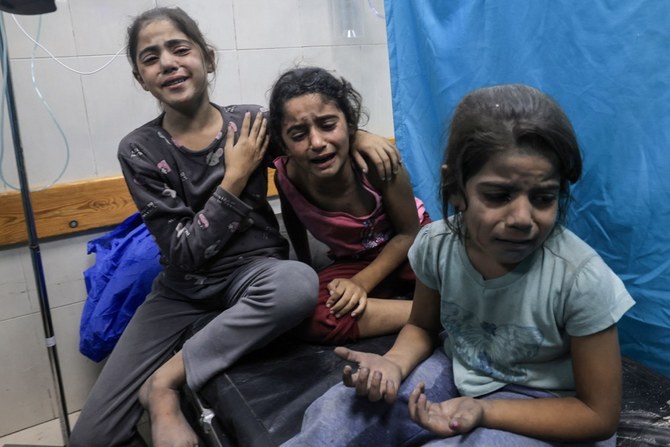LONDON: Unending waves of Israeli airstrikes on Gaza over the past fortnight have aggravated an already perilous situation for the enclave’s children, who have suffered for more than a decade with no end to the conflict in sight.
Health officials in the Gaza Strip say that more than 2,300 children have been killed in the war between Israel and Hamas that erupted following the Oct. 7 assault on southern Israel by the Palestinian militant group.
Some 40 percent of the embattled territory’s inhabitants are aged under 18, with UNICEF reporting that an average of 400 children have been killed or injured daily in the violence. Save the Children fears a further 870 remain trapped under rubble.
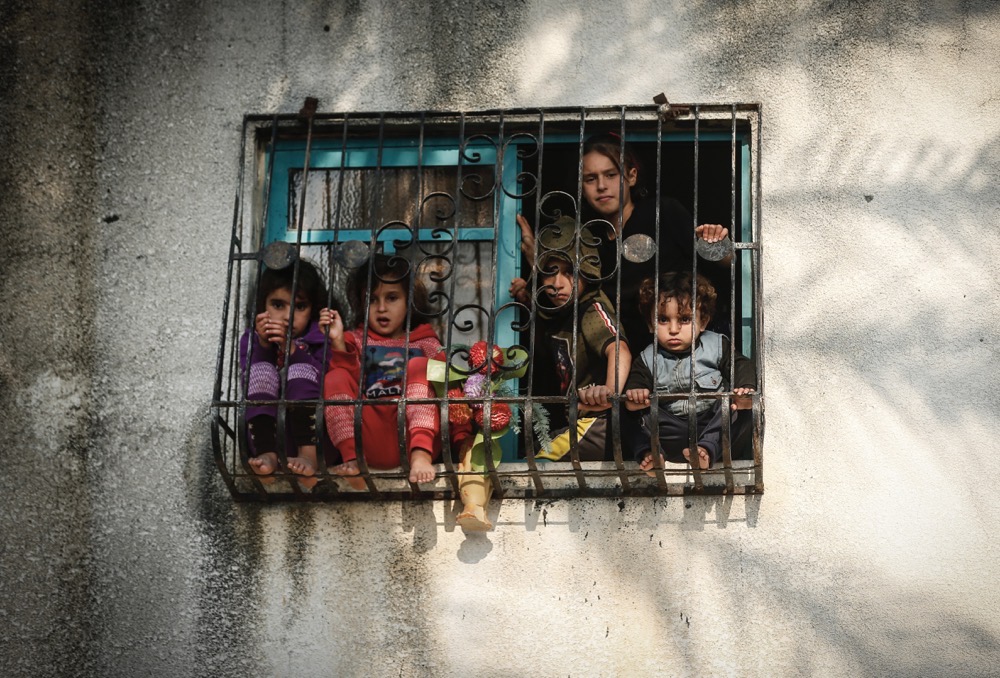
Despite the reopening of the Rafah border crossing between Egypt and Gaza on Friday and the delivery of dozens of trucks loaded with aid and medical supplies, the need for assistance remains paramount. (AFP)
Yet what sometimes goes forgotten is that beyond physical injuries, the children of the conflict zone have also had to contend with deep and long-lasting emotional trauma.
In a recent article, “Child casualties in Gaza ‘a growing stain on our collective conscience’,” UNICEF said that “almost every child in the Gaza Strip” has witnessed distressing events and trauma, with NPR noting that after the 2021 war, 91 percent of Gaza’s children had suffered post-traumatic stress.
“Children with conflict exposure have been found to have higher rates of anxiety, depression and psychosomatic complaints,” said Ayesha Kadir, a senior humanitarian health adviser at Save the Children. “(But) children do not express psychological distress in a single way. Some may act out, others may withdraw.

“They may act younger than their age, start bedwetting, have trouble sleeping, refuse to eat, or have internalizing effects such as stomach aches or headaches. Not all children who experience trauma are traumatized. However, experience of conflict is a form of toxic stress, which has both physical and psychological harms.”
Furthermore, a report produced last year by Save the Children found that more than half of the children in Gaza had suicidal thoughts, with three out of five engaging in self-harm. And with the latest surge in violence, it is not only the children of Gaza who have become direct victims.
UNICEF notes that a reported 30 children were killed in the Oct. 7 Hamas attacks on Israel, while dozens more are either themselves being held hostage within Gaza or have family in captivity.
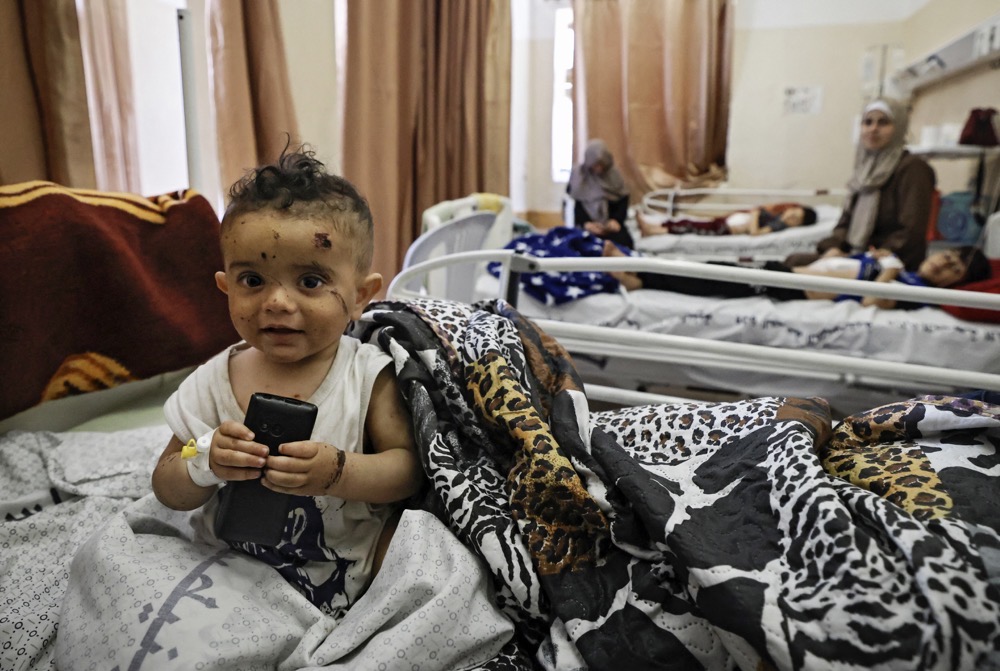
Health officials in the Gaza Strip say that more than 2,300 children have been killed. (AFP)
Jeeda Al-Hakim, a specialist counseling psychologist with the City University of London, said that for children who had witnessed bombings, missile attacks or the loss of family, the psychological manifestation of shock could compound or create additional physical issues.
“They may shake uncontrollably, become mute or unable to speak, emotionally shut down, or have panic attacks,” she told Arab News. “Inside the body, trauma triggers the release of stress hormones like cortisol and adrenaline. This leads to physical problems like headaches, stomach aches, rapid heart rate and poor sleep.”
Al-Hakim added that although closely related, shock and trauma are different. She described shock as “a state of dissociation, where the victim’s body and mind feel disconnected and nothing feels real,” and trauma as “any sudden, terrible experience that disrupts your well-being and overwhelms you.”
INNUMBERS
• 400 Children killed or injured daily in Gaza war.
• 91% Gaza children left with PTSD by 2021 war.
• 100 Aid trucks needed to meet Gaza’s daily needs
Though shock is a common response to trauma — a means for the brain to cope with a stressful or overwhelming event — not all traumatic events cause shock, while not all shock reactions are the result of trauma, Al-Hakim added.
In the midst of the conflict, it is not just exposure to violence that is affecting the mental health of Gaza’s children. Events like forced displacement, lack of access to basic needs — like education, healthcare, and sanitation — or having a family member or friend experience violence directly can take a toll on a child’s well-being and development.
Kadir said that “both direct and indirect exposure are harmful to children’s mental health, even for children who live far from the place where combat occurs,” noting that such experiences could “often compound each other.”

Having treated trauma-related challenges from the Middle East, Al-Hakim said that exposure to armed conflict can also lead to attachment disorders. Nightmares, flashbacks and persistent anxiety are also prevalent among children exposed to war — all of which can often lead to impaired development and learning.
Hamzah Barhameyeh of World Vision Syria Response, a charity supporting vulnerable children in northwest Syria, Lebanon and Iraq, said that he had witnessed all of these responses in children, adding that disruptions in attachment to caregivers can hinder a child’s ability to form secure relationships. Without this connection to people who care about them, Al-Hakim warned that a child would struggle with identity development.
“Children who have experienced trauma can then grow up to have relationship difficulties and trouble feeling close to others,” she said. “Ongoing grief and loss are extremely painful. Going through a traumatic event fractures a child’s trust in foundational ideas, including their beliefs about the world’s safety and their self-worth, leaving them feeling deeply alone.”
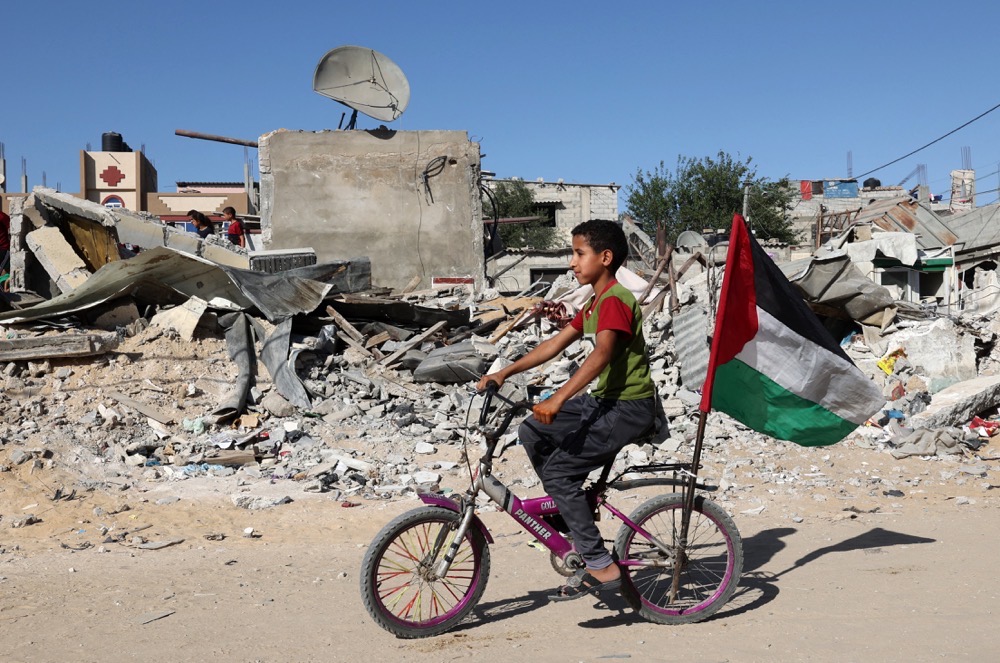
At least 1.4 million of Gaza’s population are displaced. (AFP)
While the cessation of violence is the first step toward addressing these issues, scars at this tender age may remain unhealed. Al-Hakim said that post-traumatic stress, depression, anxiety disorders, physical complaints like headaches, and thoughts of suicide may all emerge even after the violence ends, as she warned that “trauma can also be passed down through families over generations.”
Both Al-Hakim and Kadir, however, said that there were means to mitigate these effects, starting with meeting the basic needs of children, such as shelter, food, safety, schooling, healthcare, clean water and stability.
Despite the reopening of the Rafah border crossing between Egypt and Gaza on Friday and the delivery of dozens of trucks loaded with aid and medical supplies, the need for assistance remains paramount.
“The people of Gaza need a commitment for much, much more — a continuous delivery of aid to Gaza at the scale that is needed,” Antonio Guterres, the UN secretary-general, said at a peace summit in Cairo, Egypt, on Saturday.

At least 1.4 million of Gaza’s population are displaced, with about 580,000 people living in UN-run emergency shelters, according to figures shared by the Norwegian Refugee Council, which said that Gaza needs 100 aid trucks daily to meet rising needs.
According to UNICEF, “children and families in Gaza have practically run out of food, water, electricity, medicine and safe access to hospitals, following days of airstrikes and cuts to all supply routes.”
Opinion
This section contains relevant reference points, placed in (Opinion field)
To support child survivors of wars, experts have said that the basic needs of children and caregivers should be met.
“Caregiver physical and mental health have significant impacts on children’s physical and mental health,” said Kadir. “While some children will need specialized care, the majority of children will adapt positively if their basic needs are met, and appropriate psychosocial support is given.
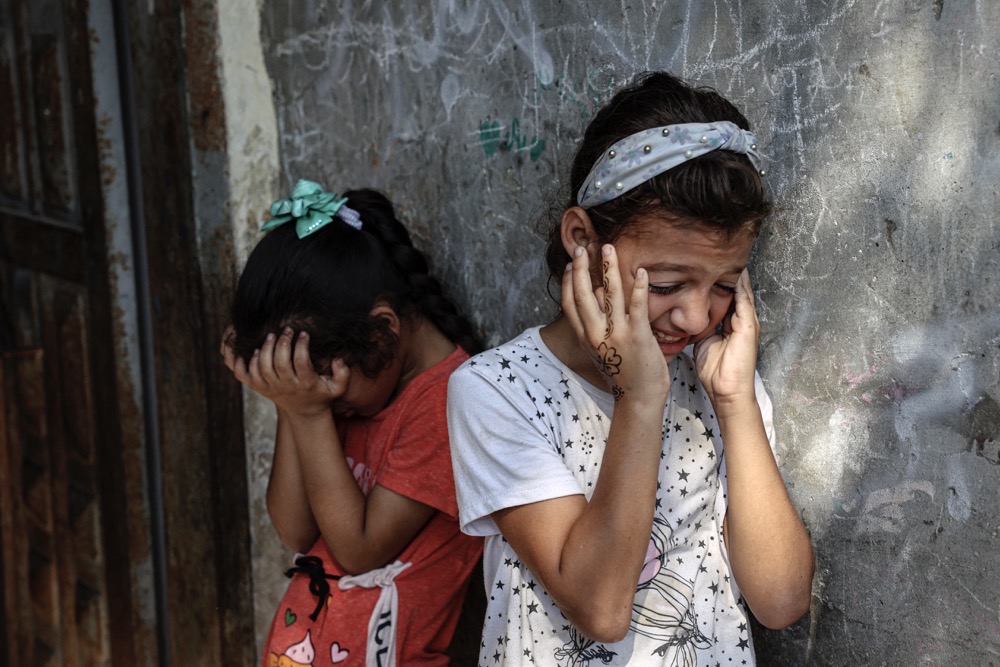
Beyond physical injuries, the children of the conflict zone have also had to contend with deep and lasting emotional wounds. (AFP)
“Supporting family and social networks, restoring a sense of safety and normality, schools, and safe places to play with their friends are vital for helping children to cope.”
Suggesting the adoption of a public health approach in the aftermath of regional conflicts, Al-Hakim highlighted the importance of educating adults about child trauma to help provide safe, nurturing environments for recovery.
“Counseling, therapy groups, school programs and community support help process the trauma, manage PTSD symptoms and build back up healthy development, coping skills and hope,” she said. “Other therapies include art, music, spiritual practices and community activities to help restore cultural traditions, family bonds, identity and meaning.”
Al-Hakim added: “A very important aspect of recovery is truth and reconciliation efforts, accountability for crimes against children and justice initiatives.
“These efforts support and facilitate societal as well as individual healing.”




